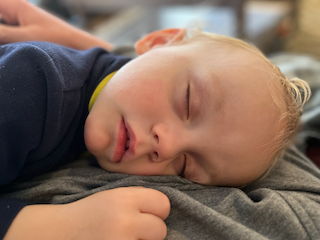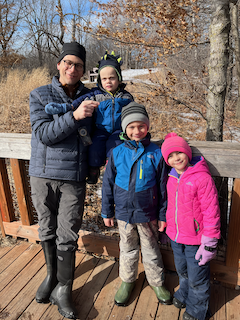I hear the two-year-old growling in the other room and I hope the eight-year-old will entertain him long enough that I can squish together some words here. I think about how he just turned two, and that maybe in a year we can introduce to him the trajectory onto which I was delivered as an almost-two-year-old: Violin lessons. And then I think about the fact that he is growling right now, in the other room, hopefully at his brother and not at some (other) scary thing hunched the corner, waiting to tackle him, and I wonder, “When will the growling turn into words?” Because, frankly, inserting into Suzuki Method violin lessons a toddler who still naps and maybe even still nurses (leave your judgment at the door, please) is borderline impossible, but to do so with one who isn’t using words yet has crossed said line and is firmly planted in the realm of absolutely batshit.
I started violin lessons before my first memory. I learned how to hold a crackerjacks box between my chin and shoulder before I knew how to tie my shoes or to sleep through the night without waking my sister, who unluckily slept in the same room. (“She’s crying!” she’d yell at the baby monitor. Whether or not anything was done about this, no one recalls.) I stood for hours on a cardboard circle with little feet traced in different colors to represent where rest position and ready position were. Practicing played out in about the same way each attempt. It always began with the prelude:
Mom: “Erin, it’s time to practice.”
Me: Either ignoring her or responding by leaving the room
Mom: “Erin, it’s time to practice.”
Me: Planting myself in the rocking recliner situated in the corner of the sunroom, a long way from anywhere Mom was, and putting on my headphones
Mom: “Erin, where are you?”
Me: Rocking in my chair
Mom: Coming to find me rocking in a chair in the dark corner, headphones essentially strapped to my ears
Me: Straight up refusing, which looked different depending on the phase of childhood
Mom: Enlisting outside help (ie, Dad)
Me: Pissed. But giving in.
Am I ready to do this with a toddler of my own? One whose only modes of communication is foot-stomping, screaming and, apparently, growling?
Whether or not I submit to such suffering is beyond my ability to predict right now, especially given the fact that I have, up until very recently, a confusing relationship with music.
Clearly, I grew up playing (rather, trying to play, or at least learning to play) classical violin. In fifth grade, I started percussion in school. A little after that, I took off singing. I went on to study classical vocal performance in college. Now, I work as a music therapist. Before the pandemic, I’d been working with adults with developmental disability, most of whom do not use speech to communicate. I aimed to use the music, and the clients’ vocalizations, to serve as a means of communication. I improvised with my voice and guitar and worked to match with the music how I perceived the clients to be feeling or interacting. It was hard. It is hard.
A few weeks ago, I attended a Songtaneous session, born of and facilitated by Sarah M. Greer. Four or five strangers Zoomed into a room wherein we improvised with our voices. The whole session was vocal improvisation, which is (for some) intimidating in person and (for many) terrifying online. (Greer is a professional; she took us through the audio set-up beforehand.)
There is something about this facilitated discomfort that teaches me how to listen and when to lead. To seek the struggle of vulnerability in this way is maybe the closest I might come to experiencing the frustration of silence when I want to speak (perhaps in my clients’ cases) and inability to express in a way that is seemingly so easy and common (in my toddler’s case). To practice this discomfort is to come closer to empathizing in a useful way. I can learn to sit in something difficult, to endure the anxiety, and know that the time inside it will pass, just as everything passes.
I often grumble that I don’t remember how to learn new skills. Because I was so little when I learned to play violin, I can’t recall the difficulty of acquiring all of the skills that need to be broken apart into bite-sized segments to be chewed on for months before they can be combined to make any kind of sense. I do remember my mother working diligently to get me to practice (see above), and I know I didn’t like that. But the actual act of skill building, and the sometimes painful pieces that that involves, is not really part of my repertoire. So now, as an adult, I am immediately pissed that I can’t do a new thing well. I am easily frustrated and annoyed. Don’t ever try to coach me on anything, especially if you’re my husband.
Vocal improvisation affords the opportunity to practice all of this; singing, with strangers, songs that aren’t songs that haven’t been composed yet. In this, I’m learning how to be uncomfortable. I’m learning to engage my discomfort in order to imagine how other people might live in the world. Not everyone has words at the ready. Not everyone gets to be heard, or to have others’ attention. Maybe I can best serve others by learning better how to step out of my comfort.
Here’s hoping my two-year-old continues making his voice heard, however that may be.
By the way, Sarah M. Greer is facilitating a Songtaneous session this coming Saturday, December 11, at 2:00 PM CST. I’ll be there. I challenge you to attend.
Also: I offer a bi-weekly newsletter I call Stories About Telling Stories. In it, I list podcast recommendations, journals and newsletters to follow, stories I’ve found out in the wild that you might love, and a general round-up of all the things I’m doing lately. Here is the last one I published, so you know what you’d get. I’d be thrilled if you’d subscribe. 🙂


